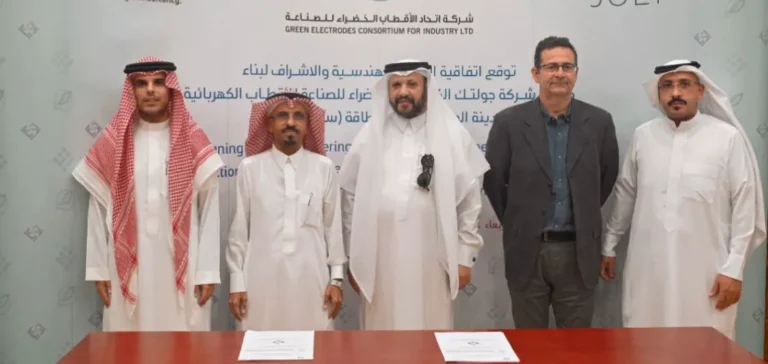Jolt Green Chemical Industries has signed an agreement with Dyar Al-Safwah Engineering Consultants to carry out engineering and oversee construction of a new advanced electrode manufacturing plant at King Salman Energy Park in Saudi Arabia’s Eastern Province. The project is supported by the Ministry of Energy and aligns with the strategic goals of the Kingdom’s Vision 2030 programme.
The industrial facility is the result of a joint venture between Green Electrodes Consortium for Industry and Spain-based Jolt Solutions. It will manufacture and refurbish high-performance catalyst-coated electrodes for various applications, including green hydrogen, water treatment, e-fuels, battery systems, disinfection, and industrial infrastructure protection.
A structuring industrial project
The production site will feature next-generation automated lines and dedicated research and development laboratories. Targeted capacity exceeds 750,000 square metres of electrodes annually, with operations scheduled to begin in the second quarter of 2027. The plant will also implement wastewater reuse systems and solar integration for industrial processes.
Dr Said Jubran Al-Qahtani, Chairman of the Green Electrodes Consortium, stated that the plant will contribute to technology localisation and the development of national expertise. He also expressed gratitude to the Ministry of Energy for its support during the project’s early stages.
Focus on regional value chain
Abdulrahman Al-Qahtani, Chief Executive Officer of Jolt Green Chemical Industries, confirmed the company’s commitment to developing a world-class facility that reinforces Saudi Arabia’s role as a regional hub for advanced technologies. The project aims to meet growing demand in hydrogen, clean industrial processes, and local energy transition initiatives.
The engineering contract was formalised at a signing ceremony attended by both partner companies. Dr Khodran Al-Zahrani, Chief Executive Officer of Dyar Al-Safwah, welcomed his firm’s participation in what he described as a key milestone for the country’s technological industrialisation.






















